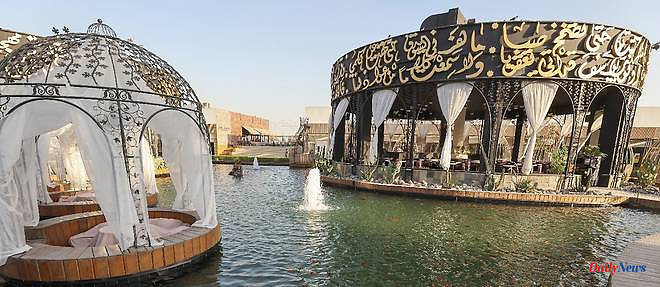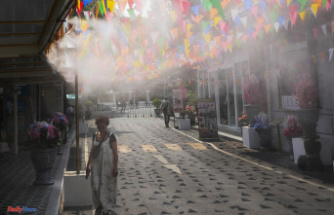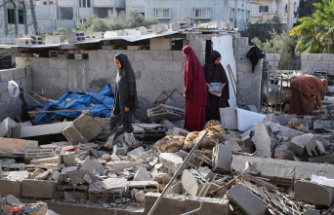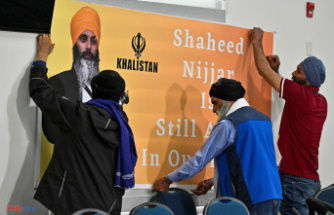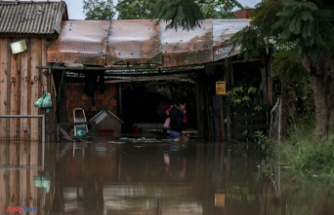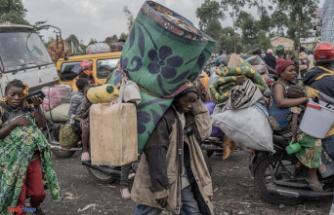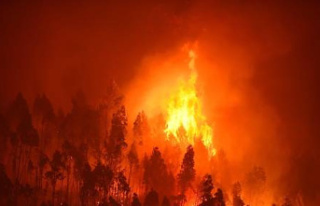Asphalted roads, sewers, luxury restaurants and hotels: thanks to relative stability after decades of conflict, Baghdad, the capital of Iraq, is getting a facelift, one of the priorities of the government which wants use this showcase to demonstrate its effectiveness.
Across the metropolis of nine million inhabitants, rehabilitation work continues to bring water and electricity to informal neighborhoods deprived of infrastructure, build bridges and redevelop avenues and sidewalks.
The fragile stability found since the defeat of the Islamic State jihadist group in 2017 also allows the opening of shopping centers, cafes and restaurants, in an Iraq used to making headlines for wars or attacks.
On the banks of the Tigris, the Thousand and One Nights complex offers 12 restaurants, several party rooms, shops and a bowling alley: on this weekend evening, there are a few dozen, coming with family or friends, to do falling skittles and smoking hookah.
Built in the park of a former palace of Saddam Hussein, the complex was inaugurated at the end of 2022, launched by “young investors who are interested in tourism” and leisure, explains its executive director, Falah Hassan.
“Iraq is a fertile land for investments,” he adds. Even if he recognizes certain “obstacles” such as “the security situation” or “bureaucracy”.
“You have to contact a thousand counters before obtaining a single authorization,” he laments.
The World Bank estimated at the end of July that "the investment climate in Iraq remained poor", citing "the absence of business-friendly legislation, an unstable security environment, administrative inefficiencies and systemic corruption".
A reality that the authorities are committed to changing, seeking to attract investors, particularly from the Gulf.
At the end of August, Prime Minister Mohamed Chia al-Soudani attended the start of construction of the luxurious Rixos hotel and residential complex, the first Qatari investment in Baghdad.
“From the Prime Minister to the smallest civil servant, we will be alongside the investor, the private sector, to carry out projects in Baghdad and in the provinces,” he promised.
More recently at the UN, Mr. Soudani recalled that “the first of our priorities is the fight against the epidemic of corruption”.
“In recent years, the Iraqi political elite and its business partners have preferred to invest their fortune in local projects, a refuge for ill-gotten gains,” underlines analyst Hayder Al-Shakeri on the website of the think-tank IRIS , from the American University of Iraq-Souleimaniyeh.
He talks about “high-end residential complexes, shopping centers, private universities.”
The fact remains that the authorities are defending a policy of modernizing infrastructure. Thus for the 2023-2025 budgets, investment spending amounts annually to $37 billion, or three times the effective amount for 2022 according to the World Bank report.
Largesse made possible by the oil windfall and colossal foreign currency reserves, reaching more than $100 billion.
Bringing together ministries, public companies and the engineering services of the army and former Hachd al-Chaabi paramilitaries, a special cell is working to rehabilitate informal neighborhoods "deprived of services for more than 20 years", explains to AFP engineer Abdel Razzak Abd Mhessein.
Its teams are at work in the earthy alleys of the Koufa district, on the outskirts of Baghdad. A bulldozer digs the road to install pipes, while a dump truck removes the rubble.
“We have a budget of around 200 billion dinars ($150 million) for infrastructure work: water, sewerage…” adds engineer Abd Mhessein, head of the Baghdad.
“There are more than 1,093 informal settlements in Baghdad and a plan has been prepared to gradually carry out work there,” he adds.
Reception among public opinion is mixed.
“This is what we dreamed of, asphalt roads and services,” enthuses Abou Ali Al-Bahadli, a 55-year-old day laborer. “Before we couldn’t go out when it rained, the road was muddy, the sewers were overflowing.”
A neighbor is more circumspect: despite the work, his street is still without electricity and running water. “Tell me which manager would agree to stay just one hour without water,” asserts Ahmed Radi, a 45-year-old civil servant.
“When are they going to install sidewalks? Gutters for rainwater?” he pleads. "We come home from work tired. There is no water, no electricity. Until when?"
09/27/2023 11:07:57 - Baghdad (AFP) - © 2023 AFP

